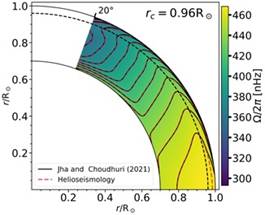It was long known the Sun’s equator spins faster than the poles. However, a peek into the internal rotation of the Sun using sound waves revealed the existence of an intriguing layer where the rotation profile of the Sun changes sharply. The layer is called as near-surface shear layer (NSSL), and it exists very close to the solar surface, where there is an outward decrease in angular velocity.
Having long probed the explanation of this layer, Indian astronomers have found a theoretical explanation for its existence for the first time. Understanding NSSL is crucial for the study of several solar phenomena like sunspot formation, solar cycle, and it will also help in understanding such phenomena in other stars.
A researcher, Bibhuti Kumar Jha, from Aryabhatta Research Institute of Observational Sciences (ARIES), an autonomous institute under the Department of Science and Technology, Govt. of India, along with the senior scientist, Prof. Arnab Rai Choudhuri, from the Indian Institute of Science, Bangalore, has for the first time given the theoretical explanation of the existence of NSSL in the Sun. This work has been published in the journal Monthly Notices of the Royal Astronomical Society.
In their study, they have used an equation called the thermal wind balance equation. It explains how the slight difference in temperature between solar poles and equator, called thermal wind term, is balanced by the centrifugal force appearing due to solar differential rotation. Most scientists believe that this condition is true only in the interior of the Sun, and it does not hold near the solar surface. In this work, the authors have shown that this belief actually holds near the surface as well.
They have noted that if this condition is true near the solar surface, it can explain the existence of NSSL, which is inferred in helioseismology (technique of using sound waves to peek inside the Sun) based observation.

Fig: The solar rotation profile calculated based on the theoretical model given by Jha and Choudhuri (2021). The solid black and dashed red contours are the contours of constant angular rotation based on the model and observation, respectively.
Publication links:
ArXiv: https://arxiv.org/abs/2105.14266
DOI: https://doi.org/10.1093/mnras/stab1717
For further details Bibhuti Kumar Jha (bibhuti[at]aries[dot]res[dot]in) and Arnab Rai Choudhuri (arnab[at]iisc[dot]ac[dot]in) can be contacted.
*****
SNC / TM / RR



